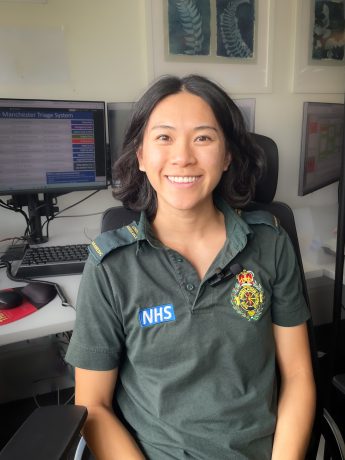First AI trial sees paramedics at London Ambulance Service treat more patients
Paramedics at London Ambulance Service are using Artificial Intelligence that will allow them to care for hundreds of extra patients a day.
For the first time, an AI tool called Ambient Voice Technology has been trialled by clinicians in the clinical hub of the Service’s 999 control room.
Senior paramedics in the clinical hub provide patients with a detailed telephone assessment during which they can give medical advice, guide them to a service in their community – like a GP – or arrange a prescription for them.
The AI technology listens to and digitally transcribes conversations between clinicians and patients and automatically transforms the spoken words into structured medical notes. These notes are then checked and approved by the paramedic.
The time and effort saved on writing notes, means paramedics can treat more people over the phone and better focus on their patients.
Paramedic Genevieve In said: “It’s very good – it types up all your notes so you don’t have to think about typing things when you are talking to your patient and the notes are concise.
“My favourite thing is when it’s listening to calls with an interpreter – often those calls can be really drawn out but this summarises them very nicely.
“I can focus purely on the patient especially when their needs are complex. And if we need to send notes to an ambulance crew we can get them over really quickly – which is much better for the patient.”
All patients were asked for consent before AI records the conversation. No patient information is stored within the AI tool to help protect patient data and ensure confidential information is kept secure.
Around 20 per cent of patients calling 999 in London are treated over the phone and the trial has been rolled out so that most of those can benefit from the new technology.
David Davis, Chief Clinical Information Officer and paramedic at London Ambulance Service, said: “With ever increasing demand on our service, we are committed to finding innovative ways to become more efficient while improving patient care.
“Colleagues in our clinical hub have a very busy and demanding role – they can treat as many as 20 patients every shift. That can add up to a lot of paperwork.
“By taking away that stress, this tool is increasing job satisfaction and giving time back to our clinicians to do what they excel at which is delivering patient care.
“We are harnessing exciting technology to improve the lives of our patients and our people.”
Paramedics in ambulances also tested the AI tool to record face-to-face conversations with patients. They also found it saved time on paperwork and the Service is further evaluating how the technology can benefit ambulance crews and their patients.
Chief Digital Officer Clare McMillan said: “If every ambulance service adopted this technology, the improvements we are seeing in London would translate into thousands more patients getting faster and better care.
“With the right clinical leadership and oversight, AI can help shape the future of urgent and emergency care delivery, helping us ease the pressures facing the NHS.”
The tool – developed by AI company TORTUS – was first tested by clinicians at Great Ormond Street and the trial was then expanded to different clinical settings and sites.
The trial results have informed the Government’s 10-year Health Plan for England, with productivity a key focus of the plan.

Follow us on social media: